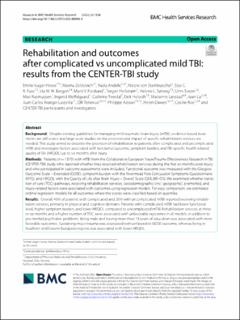| dc.contributor.author | Howe, Emilie | |
| dc.contributor.author | Zeldovich, Marina | |
| dc.contributor.author | Andelic, Nada | |
| dc.contributor.author | von Steinbuechel, Nicole | |
| dc.contributor.author | Fure, Silje Christine Reistad | |
| dc.contributor.author | Borgen, Ida Maria Henriksen | |
| dc.contributor.author | Forslund, Marit Vindal | |
| dc.contributor.author | Hellstrøm, Torgeir | |
| dc.contributor.author | Søberg, Helene L. | |
| dc.contributor.author | Sveen, Unni | |
| dc.contributor.author | Rasmussen, Mari | |
| dc.contributor.author | Kleffelgård, Ingerid | |
| dc.contributor.author | Tverdal, Cathrine Buaas | |
| dc.contributor.author | Helseth, Eirik | |
| dc.contributor.author | Løvstad, Marianne | |
| dc.contributor.author | Lu, Juan | |
| dc.contributor.author | Arango-Lasprilla, Juan Carlos | |
| dc.contributor.author | Tenovuo, Olli | |
| dc.contributor.author | Azouvi, Philippe | |
| dc.contributor.author | Dawes, Helen | |
| dc.contributor.author | Røe, Cecilie | |
| dc.contributor.author | Andreassen, Lasse | |
| dc.contributor.author | Anke, Audny Gabriele Wagner | |
| dc.contributor.author | Frisvold, Shirin | |
| dc.contributor.author | Røise, Olav | |
| dc.contributor.author | Vik, Anne | |
| dc.contributor.author | Åkerlund, Cecilia | |
| dc.contributor.author | Amrein, Krisztina | |
| dc.contributor.author | Antoni, Anna | |
| dc.contributor.author | Audibert, Gérard | |
| dc.contributor.author | Azzolini, Maria Luisa | |
| dc.contributor.author | Bartels, Ronald | |
| dc.contributor.author | Barzó, Pál | |
| dc.contributor.author | Beauvais, Romuald | |
| dc.contributor.author | Beer, Ronny | |
| dc.contributor.author | Bellander, Bo- Michael | |
| dc.contributor.author | Belli, Antonio | |
| dc.contributor.author | Benali, Habib | |
| dc.contributor.author | Berardino, Maurizio | |
| dc.contributor.author | Beretta, Luigi | |
| dc.contributor.author | Bragge, Peter | |
| dc.contributor.author | Blaabjerg, Morten | |
| dc.contributor.author | Brazinova, Alexandra | |
| dc.contributor.author | Brinck, Vibeke | |
| dc.contributor.author | Brooker, Joanne | |
| dc.contributor.author | Brorsson, Camilla | |
| dc.contributor.author | Buki, Andras | |
| dc.contributor.author | Bullinger, Monika | |
| dc.contributor.author | Cabeleira, Manuel | |
| dc.contributor.author | Caccioppola, Alessio | |
| dc.date.accessioned | 2023-02-21T14:04:59Z | |
| dc.date.available | 2023-02-21T14:04:59Z | |
| dc.date.created | 2023-01-02T19:16:25Z | |
| dc.date.issued | 2022 | |
| dc.identifier.citation | BMC Health Services Research. 2022, 22 (1), 1-16. | en_US |
| dc.identifier.issn | 1472-6963 | |
| dc.identifier.uri | https://hdl.handle.net/11250/3052823 | |
| dc.description.abstract | Background
Despite existing guidelines for managing mild traumatic brain injury (mTBI), evidence-based treatments are still scarce and large-scale studies on the provision and impact of specific rehabilitation services are needed. This study aimed to describe the provision of rehabilitation to patients after complicated and uncomplicated mTBI and investigate factors associated with functional outcome, symptom burden, and TBI-specific health-related quality of life (HRQOL) up to six months after injury.
Methods
Patients (n = 1379) with mTBI from the Collaborative European NeuroTrauma Effectiveness Research in TBI (CENTER-TBI) study who reported whether they received rehabilitation services during the first six months post-injury and who participated in outcome assessments were included. Functional outcome was measured with the Glasgow Outcome Scale – Extended (GOSE), symptom burden with the Rivermead Post Concussion Symptoms Questionnaire (RPQ), and HRQOL with the Quality of Life after Brain Injury – Overall Scale (QOLIBRI-OS). We examined whether transition of care (TOC) pathways, receiving rehabilitation services, sociodemographic (incl. geographic), premorbid, and injury-related factors were associated with outcomes using regression models. For easy comparison, we estimated ordinal regression models for all outcomes where the scores were classified based on quantiles.
Results
Overall, 43% of patients with complicated and 20% with uncomplicated mTBI reported receiving rehabilitation services, primarily in physical and cognitive domains. Patients with complicated mTBI had lower functional level, higher symptom burden, and lower HRQOL compared to uncomplicated mTBI. Rehabilitation services at three or six months and a higher number of TOC were associated with unfavorable outcomes in all models, in addition to pre-morbid psychiatric problems. Being male and having more than 13 years of education was associated with more favorable outcomes. Sustaining major trauma was associated with unfavorable GOSE outcome, whereas living in Southern and Eastern European regions was associated with lower HRQOL.
Conclusions
Patients with complicated mTBI reported more unfavorable outcomes and received rehabilitation services more frequently. Receiving rehabilitation services and higher number of care transitions were indicators of injury severity and associated with unfavorable outcomes. The findings should be interpreted carefully and validated in future studies as we applied a novel analytic approach. | en_US |
| dc.language.iso | eng | en_US |
| dc.publisher | BMC | en_US |
| dc.rights | Navngivelse 4.0 Internasjonal | * |
| dc.rights.uri | http://creativecommons.org/licenses/by/4.0/deed.no | * |
| dc.title | Rehabilitation and outcomes after complicated vs uncomplicated mild TBI: results from the CENTER-TBI study | en_US |
| dc.title.alternative | Rehabilitation and outcomes after complicated vs uncomplicated mild TBI: results from the CENTER-TBI study | en_US |
| dc.type | Peer reviewed | en_US |
| dc.type | Journal article | en_US |
| dc.description.version | publishedVersion | en_US |
| dc.source.pagenumber | 1-16 | en_US |
| dc.source.volume | 22 | en_US |
| dc.source.journal | BMC Health Services Research | en_US |
| dc.source.issue | 1 | en_US |
| dc.identifier.doi | 10.1186/s12913-022-08908-0 | |
| dc.identifier.cristin | 2099191 | |
| cristin.ispublished | true | |
| cristin.fulltext | original | |
| cristin.qualitycode | 2 | |

